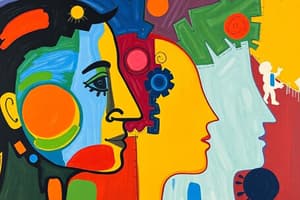Podcast
Questions and Answers
What is the primary challenge adolescents face in Erikson's identity vs role confusion stage?
What is the primary challenge adolescents face in Erikson's identity vs role confusion stage?
- Developing a clear sense of self (correct)
- Comprehending external authority
- Establishing peer relationships
- Understanding moral principles
Which identity status in Marcia's theory represents an individual who has made commitments to values and goals?
Which identity status in Marcia's theory represents an individual who has made commitments to values and goals?
- Identity achievement (correct)
- Foreclosure
- Identity diffusion
- Moratorium
What does the term 'androgynous' refer to in the context of gender role identity?
What does the term 'androgynous' refer to in the context of gender role identity?
- Strict adherence to traditional gender roles
- High levels of feminine traits and low levels of masculine traits
- High levels of both feminine and masculine traits (correct)
- Low levels of both feminine and masculine traits
In Kohlberg's stages of moral reasoning, which stage involves self-chosen principles?
In Kohlberg's stages of moral reasoning, which stage involves self-chosen principles?
What is a common characteristic of youth who engage in antisocial behavior according to the content provided?
What is a common characteristic of youth who engage in antisocial behavior according to the content provided?
How does self-understanding in adolescence differ from that in childhood?
How does self-understanding in adolescence differ from that in childhood?
What typically happens to adolescent-parent interactions during early adolescence?
What typically happens to adolescent-parent interactions during early adolescence?
Which is true about romantic relationships in adolescence?
Which is true about romantic relationships in adolescence?
Study Notes
Erikson’s Identity vs Role Confusion Stage
- Adolescents face a crisis of identity, seeking to understand who they are and their cultural belonging.
Marcia’s Theory of Identity Development
- Encompasses four identity statuses:
- Identity achievement: A clear sense of self after exploration.
- Moratorium: Active search for identity, without commitment yet.
- Foreclosure: Commitment made without exploration, usually reflecting parental values.
- Identity diffusion: Lack of commitment and exploration, leading to confusion.
Gender Role Identity in Adolescents
- Related to psychological self-concept and how gender is perceived.
- Gender Role Types:
- Masculine: Low femininity, high masculinity.
- Feminine: High femininity, low masculinity.
- Androgynous: High levels of both femininity and masculinity.
- Undifferentiated: Low levels of both traits.
Self-Understanding in Adolescence
- Adolescents develop more abstract self-definitions compared to childhood.
- Increased emphasis on enduring internal qualities and ideologies.
Kohlberg’s Stages of Moral Reasoning
- Comprised of three main stages:
- Preconventional: Morality is based on external authority, focusing on punishment and rewards.
- Conventional: Morality is guided by societal norms and rules.
- Postconventional: Development of self-chosen moral principles.
- Stages are generally age-correlated, develop in order, and appear across cultures.
- Criticism: Moral reasoning may rely more on emotional factors rather than justice and fairness concepts.
Moral Reasoning and Antisocial Behavior
- Youth engaging in antisocial acts often show slower development in role-taking and moral reasoning compared to peers.
Adolescent-Parent Interactions
- Interactions often become more conflicted, with strong parent attachments still predictive of positive peer relationships.
Peer Relationships and Influences
- Adolescents are particularly susceptible to peer influences, impacting behavior and identity.
- Development of romantic relationships typically emerges from friendships in both heterosexual and homosexual contexts.
Studying That Suits You
Use AI to generate personalized quizzes and flashcards to suit your learning preferences.
Description
This quiz explores Erikson's identity versus role confusion stage, emphasizing its significance during adolescence. It also examines Marcia's theory of identity development and the different statuses that adolescents may encounter, along with the development of gender role identity and ethnic identity.




